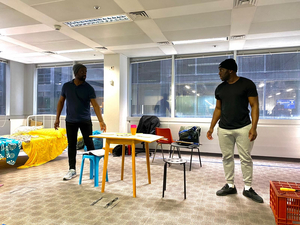Guest Blog: Tom Littler On Leaving Many A Theatrical 'Footprint'
The Artistic Director of Jermyn Street Theatre on Reopening to the Public At Last

In retrospect, we look naïve. The afternoon of Friday 13 March 2020, I was signing a deal with a regional theatre. That evening, I welcomed a packed press night audience to Jermyn Street Theatre, the West End studio which I run, to see The Tempest, starring Michael Pennington as Prospero. By Saturday, as France slid into lockdown, I was rethinking my planned Parisian getaway, and our reviews for The Tempest were coming out.
Sunday saw plans made and remade at breakneck speed, leading up to the now infamous moment on Monday, a couple of hours before curtain-up, when the prime minister "advised" the public not to go to theatres - invalidating insurance at a stroke. We performed to sixteen people that night. The next day, we crept back into an eerie West End to film and audio-record the production. That night, on an empty train home to Cambridge, I wondered when I would return to London. A fortnight? Six weeks? The answer was July. I also wondered how long it would be before an audience re-entered our theatre. The answer was fourteen months.
.jpg)
executive producer, Jermyn Street Theatre
Coronavirus first appeared as an unwelcome interval, not a five-act tragedy. The initial weeks were spent in shock, frantic activity, and a quest for information. Bankruptcy was a constant threat. We plunged into a digital programme - we launched the Sonnet Project on 21 March - because inactivity was too depressing to contemplate. Audiences began to donate. In mid-April, our Board approved my strategy to keep our little team in their jobs. Our aims were to entertain our isolated audience, to connect our family of freelancers, and to raise the funds needed to reopen in September. The Board backed me. We were relieved and defiant. We had a plan.
The next day, Penny Horner - our co-founder and Executive Director - rang me from the theatre. I could hear sirens in the background. A pipe had burst in a demised room of a neighbouring building. There were 40,000 gallons of water - a depth of five feet - flooding our dressing rooms, offices, and workshops. There is insurance for floods, if not for plagues, but the physical and psychological damage of the flood was huge.
By late spring, our plans to reopen in September felt unlikely. We have 70 seats - social distancing reduces our capacity to 25. We cannot function without full houses. We announced closure until the end of 2020. The decision gave us planning space: we stepped up our digital ambitions and formed new partnerships. At the same moment, the protests after the murder of George Floyd swept the world and the consciousness of everyone in theatre. It was a wake-up call to many arts leaders about our approach and responsibility to the values of diversity and inclusion. Meanwhile, other sands were shifting. We invested in developing the next generation of theatre artists, and we sponsored an individual to join the Freelance Task Force, one of several groups speaking for freelance theatre workers who felt forgotten in the campaign that led - too late for some but just in time for us and for many more institutions - to the Cultural Recovery Fund.
15 Heroines began as a failed pitch to the BBC. Dramatizing fifteen of Ovid's letters did not strike them as a very bright idea, but thankfully others, including Digital Theatre, were "avid for Ovid", as The Observer later put it. This madcap project was a whirl of commissioning and planning, and by October we were back in the theatre filming fifteen new plays by fifteen remarkable female and nonbinary playwrights. Their broadcast coincided with the November lockdown and broke our box office records, without a single audience member entering the building. By the end of 2020, a raft of digital and pastoral projects had employed over 300 theatre freelancers, many of them in small jobs - but jobs that mattered. It was to those freelancers that we dedicated our 2021 Stage Award for Fringe Theatre of the Year.
We thought we would reopen in June, then September, December, February. We are now doing what I always swore was madness. It is financial folly to open with 25 seats on sale, and at a moment when many audiences are only just venturing out see their families or have their first outdoor pint. And if we must reopen in this impossible climate, the smart choice is a starry two-hander. Cheap, easy to sell. And yet, and yet... Those freelance artists, and those audience members who have kept us afloat, are our family. Whatever the costs, it is time for families to meet again.
We are reopening with a three-month programme of 43 simply staged, beautiful, funny shows. Drama, cabaret, classics, poetry, solos, showcases. Actors, stories, audiences. All 43 shows are live-streamed for people who cannot make it to the theatre. On 17 May, the lights go up on Biyi Bandele's wonderful play Two Horsemen [pictured above in rehearsal], directed by our new Carne Deputy Director Ebe Bamgboye. Audiences - temperature-checked and masked - will settle into their seats, in the company of strangers, to share a story. We named this season the Footprints Festival. Fingers crossed, breath held, we take 43 strides into an unknown future.
Footprints Festival runs 17 May - 1 August at Jermyn Street Theatre live and online.
Comments

Videos

